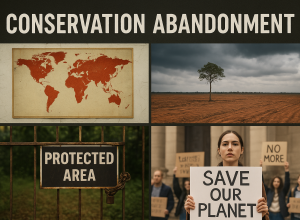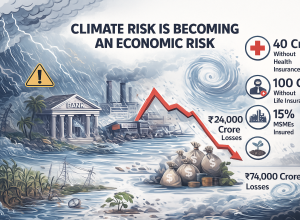“We Don’t Just Need Smart Cities, We Need Smarter Citizens”
In March 2019, standing just a few hundred miles from the North Pole as part of the 2041 Foundation expedition, environmentalist and Entrepreneur Neelima Mishra stared out across a glacial expanse, and into the heart of a global crisis. Surrounded by the surreal beauty of the Arctic, she also encountered its ugly secret: plastic bottles, cigarette butts, abandoned fishing nets and bits of trash lodged in snowdrifts. When she returned to her home city of Bhubaneswar, Odisha, the lens through which she saw the world had changed. And so, later that year, Ceiba Green Solutions was born, rooted in a simple but powerful idea — to reduce the volume of waste going to landfills while empowering citizens to take charge of their own waste footprint. The journey, however, was anything but linear.
Please tell us about your journey?
It’s important to realise that while we clean our own homes, we often end up dirtying our larger home—the planet. That realisation truly hit me during an expedition I undertook in 2019 to the Arctic, as part of the 2041 Foundation. Even in those pristine polar regions, I saw plastic bottles, cigarette butts, fishing nets—waste that had travelled far and wide. The shock of seeing human neglect in such a remote part of the planet stayed with me.
When I returned to Odisha, I couldn’t unsee the daily waste and litter around me. That’s when I knew I had to be part of the solution, not just a silent witness. We founded Ceiba Green Solutions in Bhubaneswar later that year. Of course, the pandemic hit soon after, and our plans had to be rethought. But we adapted—conducting online workshops, trainings, and continuing what work we could on the ground.
In 2021, I pursued my Master’s in the UK with a thesis on waste management. On returning, I dived back into the startup full time, determined to take our mission forwardSeeing plastic in the Arctic changed everything for me.
What is the focus of your organisation?
At Ceiba, our work revolves around four pillars—wet waste management, single-use plastic alternatives, waste-free events, and awareness-building. We provide composting services to bulk waste generators—like hotels, colleges, and government canteens—as well as individual households. Our belief is simple: if waste is segregated and composted at source, we drastically reduce what ends up in landfills.
On the dry waste side, we built the Recycle Pay app, which lets people schedule waste pickups and receive payments for recyclable materials. It’s our way of creating a micro-incentive economy around segregation.
We also launched an e-commerce platform that curates plastic-free, biodegradable products from various vendors. Sustainability should be accessible—and we’re working to make it mainstream.
Additionally, we run educational outreach programs and workshops in schools, colleges, and communities. Though our plans for zero-waste events haven’t gained traction yet, we’re hopeful for future partnerships.
What is your vision and expansion plan?
Our long-term vision is to significantly reduce landfill waste, lower GHG emissions, and make measurable progress toward the Sustainable Development Goals (SDGs). Instead of spreading ourselves thin across the country, we’re focused on deepening our impact in Odisha and Tier II cities across Eastern
India. And we’re happy to collaborate. Many organisations are doing excellent work and this is a time to work together, not just compete.
What advise would you like to give to individuals wanting to start their green business?
You don’t need to be an entrepreneur to fight climate change. You can be part of a local group, raise awareness in your neighborhood, or make sustainable lifestyle choices. That alone makes a difference.
If you do want to start a green venture, take time to understand your sector deeply. Get a good mentor and it should be someone who can challenge and guide you. Join incubator programs or networks that help refine your ideas and strategy. Passion is vital, but without a business model, it’s not sustainable.
Any lessons learnt during your journey that you would like to share with us?
Plenty. But one that stands out is this: passion alone won’t carry you through. You need to back it up with a viable business strategy. It’s easy to get caught
up in the idealism of the green movement, but the ground reality involves numbers, scale, and execution.
Also, staying honest in a space like this is vital. There’s a lot of greenwashing out there, and it erodes trust. If you’re working for the planet, your integrity must be non-negotiable, towards both the environment and the people you serve.
How has being a green entrepreneur impacted your personal values?
Actually, it was the other way around. My personal values shaped the business. I’ve always loved the outdoors. That love became the anchor for Ceiba. Every
time we reach a new person, we grow that love. Every compost bin installed, every plastic-free product sold, every school session held and that is how we
expand our circle of impact.
Do you think the time for green businesses is here?
Without a doubt. We are already witnessing a tectonic shift in how we live and consume. I believe five areas will define the new green economy—how we manufacture, how we eat, how we travel, how we consume energy, and how we live.
But this transformation isn’t just the responsibility of green startups. Corporates, tech firms, and even local governments must integrate sustainability into their ecosystems. We need systemic change. And that’s where it all starts with you and me. With every choice we make.





